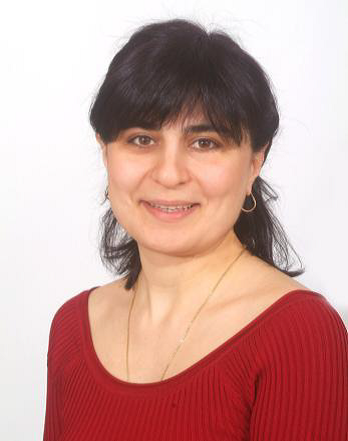Prof. Dr. med. Tamara Tchelidze

Scientist and major consultant at Marketing and contact person for the Contract Research Organization "Medconsult-Geo" LCC in USA, Germany, Austria
Working experience
1.11.2013 – till present Medical Manager at pharmaceutical company GEA. Area of activity: market analysis, product choosing, product regulation and marketing strategies; seeking new possible partners and developing international partnership, holding business meetings, pursuing and collecting new scientific data on new products, their processing, presenting mentioned data on round tables and conferences, teaching and training of sales representatives.
1.09.2012 – till present Professor at Caucasus University, Tbilisi, Georgia.
1.06.2013 – 15.10.2013 Specialist at the department of Foreign Affairs at the National Academy of Sciences of Georgia. Area of activity: heading international relations.
1.04.2008 – 30.09.2011 Moderator at the “Institute of Public Research”, Tbilisi, Georgia. Area of activity: managing focus groups actively socialized with broad public masses, drafting budgets, collecting data and writing reports.
1.09.2007 – 30.05.2008 Teacher of Medical Biology at Tbilisi State Medical University.
15.09.2003 – 31.08.2007 Postdoctoral Fellow at the University of Zurich (Switzerland), Department of Neurology. Area of activity: using in-vivo techniques and conducting electrophysiological and behavioural experiments on monkeys and humans. Presenting scientific data on national and international meetings.
1.05.2003 – 14.09.2003 Consultant at BIONIK (Munich, Germany).
1.01.2003 – 1.05.2003 Biologist-translator at BINOMED (Ulm, Germany). Working on international projects.
7.11.1997 – 31.12.2002 Research Associate in the beginning and later scientist in the Laboratory of Vestibular and Oculomotor Research at the Ludwig-Maximilian University in Munich (Germany), Clinic Grosshadern, Department of Neurology. Area of activity: using in-vivo techniques, conducting electrophysiological experiments on monkeys in Munich and Prague (Vestibulo-Oculomotoric Laboratory at the Czech Republic Academy of Sciences); analysing the data with different software; co-author of scientific papers.
01.1994 – 06.1994 34th German High School, Teaching Natural Sciences
1.09.1993 – 1.11.1997 Research Associate at the Department of Animal and Human Physiology at the Tbilisi State University. Learned in-vivo techniques (rats, cats and rabbits); duties also included the organization of scientific conferences for faculty students.
Education
07.03.2002 Successful defence of the doctoral thesis (PhD in Neurophysiology) on “Three dimensional vestibular processes in fastigial nucleus of a monkey”. The thesis was written at Ludwig-Maximilian University, Munich, Germany and was then defended at the Institute of Physiology of Georgian Academy of Sciences, Tbilisi.
1988 - 1993 Tbilisi State University, Faculty of Biology, specializing in Human and Animal Physiology.
1976 - 1987 Gymnasium (High School) N 61, Tbilisi, Georgia.
Languages Georgian (native)
English (fluent), German (fluent), Russian (fluent)
Computer Skills Microsoft Office, Spike 2, Matlab, Matlab programming language
Professional Enhancement Courses
Animal’s Models of Nervous System Diseases (organized by the Swiss Society of Neuroscience)
Special course on Primates (organized by the primate centre in Göttingen)
9.12.2005 Planning and organization of animal experiments (organized by the University Zurich)
5-6.12.2007 Round Table Symposium “The Technical Enablers and Challenges of Biological Terrorism” (organized by Tbilisi State Medical University, US Civilian Research & Development Foundation, and Georgian Association of Medical Specialties)
03.2007 Assessment Centre at “Sanofi-Aventis” (Geneva, Switzerland)
List of Publications
- Fasigial nucleus activity during different frequencies and orientations of vertical vestibular stimulation in the monkey. Dept. Of neurology, University of Munich, 81377 Munich, Germany. Siebold-C; Kleine J-F; Glonti-L; Tchelidze-T; Büttner-U. Journal of Neurophysiology, Bethesda. July, 82 (1): 34-41, 1999
- Canal-otolith interaction in the fastigial nucleus of the alert monkey. Dept. Of Neurology, University of Munich, 81377 Munich, Germany. Siebold-C; Anagnostou-E, Glasauer-S; Glonti-L; Kleine J-F; Tchelidze-T; Büttner-U. Experimental Brain Research. 136, January, 2001.
- Influence of different frequencies on the sensitivity of fastigial neurons. Tchelidze-T; Glonti-L; Kleine J-F; Siebold-C; Büttner-U. Bulletin of the Georgian Academy od Sciences. 164, No 2: 342-344, 2001.
- Discharge properties of saccade-related neurons in the oculomotor region of the primate fastigial nucleus. Kleine J.F., Guan Y.F., Langer S., Straka H., Tchelidze T. and Büttner U. Annals of New York Academy of Sciences. 978: 526-528, 2002.
- Multimodal signal integration in vestibular neurons of the primate fastigial nucleus. Büttner U, Glasauer S, Glonti L, Guan Y, Kipiani E, Kleine J, Siebold C, Tchelidze T, Wilden A. Annals of New York Academy of Sciences. 2003 Oct; 1004: 241-51.
Noncommutative control in the rotational vestibulo-ocular reflex. Tchelidze T, Hess BJ. Journal of Neurophysiology, 2008 Jan; 99(1): 96-111. Epub 2007 Nov 7.
- The contribution of otolith inputs to the response of “vestibular only” neurons in the fastigial nucleus of the alert monkey. Siebold-C; Tchelidze-T; Kleine J-F; Glonti-L; Glasauer-S; Büttner-U. Society for Neuroscience Abstracts. 25 (1-2): 663, 1999.
- Influence of head position and target location on the VOR in the rhesus monkey during eccentric rotation. Ditterich-J; Fuhry-L; Nedvidek-J; Haburcakova-C; Tchelidze-T; Büttner-U. Annual meeting of the Association in Vision and Optalmology: Fort Lauderlade, Florida, USA, April 30-May 05, 2000, abstract
- Do vestibular cues suffice for updating self-orientation in space following whole body rotations? Tchelidze, T.; Hess, B. J. ZNZ Symposium 2004, Zurich, 2004; pp. 50., abstract
- Non-commutativity in the vestibulo-ocular reflex in monkey, Tchelidze, T.; Hess, B. J. Fourth day of Clinical Research, Zurich, March 10-11, 2005, Zurich, 2005; pp. 153., abstract
- Vestibular contribution to updating orientation in space following whole body rotations. Tchelidze, T.; Hess, B. J. Abstracts of the 13th European Conference on Eye Movements ECEM13, Groner, M.; Groner, R.; Müri, R.; Koga, K.; Raess, S.; Sury, P., editors; Vislab: Bern, 2005; pp. 102., abstract
- The role of otoliths in memory-contingent VOR in humans. Tchelidze, T.; Hess, B. J. ZNZ Symposium 2005, Zurich, 2005; pp. 78., abstract
- Vestibular guidance of gaze during sequences of whole-body rotations in the rhesus monkeys. Tchelidze, T.; Hess, B. J. Society for Neuroscience 35th Annual Meeting 2005. Online., abstract